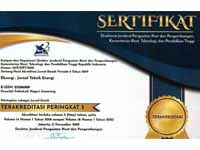ANALISA HEAT RATE DENGAN VARIASI BEBAN PADA PLTU PAITON BARU (UNIT 9)
DOI:
https://doi.org/10.32497/eksergi.v10i1.240Abstract
Heat rate adalah ukuran keandalan dari suatu unit pembangkit. Heat rate didefinisikan sebagai jumlah energi bahan bakar yang dibutuhkan untuk menghasilkan energi listrik sebesar 1 kwh. Tujuan penelitian ini adalah menentukan heat rate suatu unit pembangkit dengan variasi beban terhadap konsumsi batubara spesifik dan biaya produksi listrik pada PLTU Paiton Baru (Unit 9). Heat rate dapat ditentukan dengan mengetahui efisiensi boiler metode kerugian panas dan heat rate turbin.Parameter data untuk menentukan nilai heat rate didapatkan dari analisa laboratorium dan ruang kontrol PLTU Paiton Baru (Unit 9). Dari data tersebut dilakukan pengolahan data untuk menentukan nilai heat rate dengan variasi beban sehingga didapatkan konsumsi batubara spesifik dan biaya produksi listrik. Dari hasil pengolahan data maka didapatkan grafik hubuganheat rate terhadap beban yang bervariasi, konsumsi batubara spesifik, dan biaya produksi listrik. Dari hasil perhitungan yang dilakukan diperoleh hasil heat rate terendah yaitu 2416,22 kcal/kWh pada beban 659 MW dengan nilai konsumsi batubara spesifik adalah 0,572 kg/kWh dan biaya produksi listrik 400,32 Rp/kWh. Sehingga dapat dikatakan bahwa semakin kecil nilai heat rate maka semakin rendah konsumsi batubara spesifik dan semakin kecil biaya produksi listrik.Kata kunci : Heat rate, Konsumsi batubara spesifik, Biaya produksi listrik
Downloads
Published
Issue
Section
License
Authors who publish with this journal agree to the following terms:Authors retain copyright and grant the journal right of first publication with the work simultaneously licensed under a Creative Commons Attribution License that allows others to share the work with an acknowledgement of the work's authorship and initial publication in this journal.
Authors are able to enter into separate, additional contractual arrangements for the non-exclusive distribution of the journal's published version of the work (e.g., post it to an institutional repository or publish it in a book), with an acknowledgement of its initial publication in this journal.
Authors are permitted and encouraged to post their work online (e.g., in institutional repositories or on their website) prior to and during the submission process, as it can lead to productive exchanges, as well as earlier and greater citation of published work (See The Effect of Open Access).






